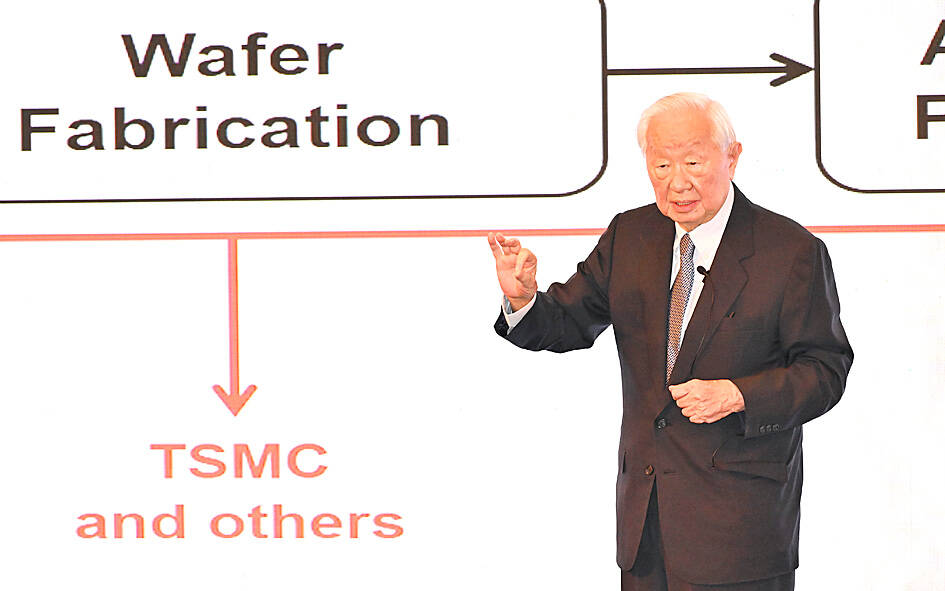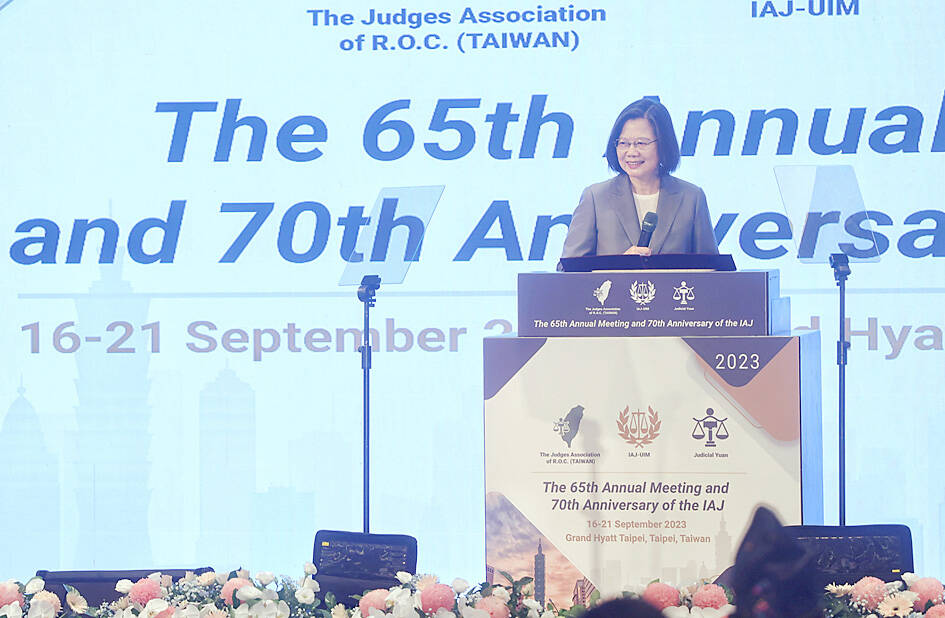Taiwan Semiconductor Manufacturing Co (TSMC, 台積電) founder Morris Chang (張忠謀) yesterday said that a sustainable supply of high-quality and dedicated engineers, and a low turnover rate are contributing factors to Taiwan’s leadership in the global chipmaking industry.
Chang delivered a speech on Taiwan’s competitive advantages in the chip sector at the 70th anniversary of the International Association of Judges (IAJ) in Taipei.
Chang founded the world’s largest contract chipmaker, or foundry, in 1987. The chipmaker now offers research and development, wafer fabrication and advanced packaging, which are capital and technology-intensive businesses, he said.

Photo: Tien Yu-hua, Taipei Times
Chips made by TSMC can be found in national defense, smartphones and vehicles, he said.
In developed countries, about 2.5 billion people use Taiwan-made chips for the devices they use in their daily lives, he added.
As chip manufacturing is a crucial industry and the only crucial industry for Taiwan to be a leader, it needs to defend its leadership position, Chang said.

Photo: CNA
With a highly educated population, Taiwan has plenty of high-quality and dedicated engineers, Chang said.
Those young people are willing to work in the tough chip manufacturing environment, wearing heavy outfits that look like space suits, he added.
TSMC has an employee turnover rate of about 4 to 5 percent annually, which is much lower than the 15 to 20 percent at US companies during the 1970s and the 1980s, he said, adding that a high turnover was “certainly a disaster problem” as it takes years to train technicians and engineers, he said.
The US used to have the most advanced wafer fabrication technology in the world, but things have changed, he said.
TSMC now offers the world’s most advanced foundry technology, outpacing Intel Corp.
Taiwan’s foundry-centric semiconductor fabrication supply chain is also one advantage, with major equipment suppliers ASML Holding NV and Applied Materials Inc setting up service centers in Taiwan, he said.
The Ministry of Economic Affairs yesterday approved an additional US$4.5 billion (US$140.7 million) funding for TSMC’s fab construction in Arizona.
The new funding would help enhance TSMC’s partnership with customers, and would help grow Taiwan’s semiconductor industry and deepen its connections with supply chains, it said.
President Tsai Ing-wen (蔡英文) also gave a speech at the IAJ event, saying the government is striving to reach the highest international standards in judicial independence and human rights protection.
“We cannot take judicial independence for granted. It must be continuously upheld through individual commitments and institutional protections in Taiwan,” Tsai said.
The last time the IAJ held its annual meeting in Taiwan, in 1999, it adopted the Universal Charter of the Judge — a “landmark document” that has helped enshrine the value of judicial independence, Tsai said.
Serving as a blueprint for protecting judicial independence, the charter states that judges should “ensure the rights of everyone to a fair trial” and “exercise judicial powers free from social, economic and political pressure,” she said.
The nation’s commitment to democracy “drives our efforts to build a judicial system that is transparent, accountable and responsive to the people it serves,” she said.
The citizen judge system, where professional judges are joined by members of the public in trials, was launched this year as an effort to ensure greater fairness and trust in the judicial system, she added.
Judicial Yuan President Hsu Tzong-li (許宗力) said in his speech that as judicial departments are facing various challenges and difficulties in a rapidly changing global environment, “it is indispensable that judges around the world strengthen their cooperation and exchanges” to safeguard freedom, judicial independence and human rights.

A magnitude 7.0 earthquake struck off Yilan at 11:05pm yesterday, the Central Weather Administration (CWA) said. The epicenter was located at sea, about 32.3km east of Yilan County Hall, at a depth of 72.8km, CWA data showed There were no immediate reports of damage. The intensity of the quake, which gauges the actual effect of a seismic event, measured 4 in Yilan County area on Taiwan’s seven-tier intensity scale, the data showed. It measured 4 in other parts of eastern, northern and central Taiwan as well as Tainan, and 3 in Kaohsiung and Pingtung County, and 2 in Lienchiang and Penghu counties and 1

A car bomb killed a senior Russian general in southern Moscow yesterday morning, the latest high-profile army figure to be blown up in a blast that came just hours after Russian and Ukrainian delegates held separate talks in Miami on a plan to end the war. Kyiv has not commented on the incident, but Russian investigators said they were probing whether the blast was “linked” to “Ukrainian special forces.” The attack was similar to other assassinations of generals and pro-war figures that have either been claimed, or are widely believed to have been orchestrated, by Ukraine. Russian Lieutenant General Fanil Sarvarov, 56, head

‘POLITICAL GAME’: DPP lawmakers said the motion would not meet the legislative threshold needed, and accused the KMT and the TPP of trivializing the Constitution The Legislative Yuan yesterday approved a motion to initiate impeachment proceedings against President William Lai (賴清德), saying he had undermined Taiwan’s constitutional order and democracy. The motion was approved 61-50 by lawmakers from the main opposition Chinese Nationalist Party (KMT) and the smaller Taiwan People’s Party (TPP), who together hold a legislative majority. Under the motion, a roll call vote for impeachment would be held on May 19 next year, after various hearings are held and Lai is given the chance to defend himself. The move came after Lai on Monday last week did not promulgate an amendment passed by the legislature that

FOREIGN INTERFERENCE: Beijing would likely intensify public opinion warfare in next year’s local elections to prevent Lai from getting re-elected, the ‘Yomiuri Shimbun’ said Internal documents from a Chinese artificial intelligence (AI) company indicated that China has been using the technology to intervene in foreign elections, including propaganda targeting Taiwan’s local elections next year and presidential elections in 2028, a Japanese newspaper reported yesterday. The Institute of National Security of Vanderbilt University obtained nearly 400 pages of documents from GoLaxy, a company with ties to the Chinese government, and found evidence that it had apparently deployed sophisticated, AI-driven propaganda campaigns in Hong Kong and Taiwan to shape public opinion, the Yomiuri Shimbun reported. GoLaxy provides insights, situation analysis and public opinion-shaping technology by conducting network surveillance